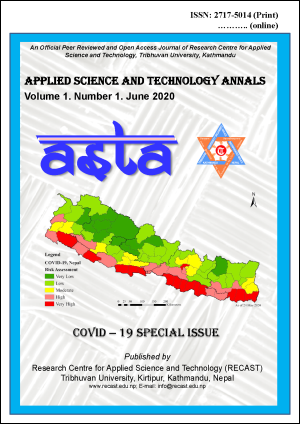Coronaviruses in animals and humans, COVID-19 pandemic and one health approach
DOI:
https://doi.org/10.3126/asta.v1i1.30305Keywords:
Coronavirus, COVID-19, One Health, Pandemic, SARS-CoV-2Abstract
Coronaviruses can infect several animal species including cattle, pigs, dogs, and cats resulting in diseases related to respiratory and gastrointestinal systems. In humans, coronaviruses generally cause mild to moderate illnesses of the respiratory tract. Severe Acute Respiratory Syndrome Coronavirus (SARS-CoV) and Middle East Respiratory Syndrome Coronavirus (MERS-CoV), which emerged during 2002/03 and 2012/13 respectively, caused severe respiratory illnesses in humans. In December 2019, a novel respiratory coronavirus, SARS coronavirus 2 (SARS-CoV-2) emerged from Wuhan, China and caused coronavirus disease 2019 (COVID-19). Owing to the rapid spread of this virus, World Health Organization (WHO) declared COVID-19 outbreak as a global pandemic, which claimed over 300,000 lives by 16th May 2020. Data available so far indicate that COVID-19-associated severe illnesses, hospitalizations and deaths are more common in elderly above 65 years of age; in men; and in individuals with underlying health conditions such as cardiovascular disease, hypertension and diabetes. SARS-CoV-2 is considered to be emerged from bats and likely involved certain, yet to be identified, intermediate animal host. Prevention and control of ongoing COVID-19 pandemic and possible disease outbreaks in the future by other emerging and reemerging pathogens, requires efficient implementation of one health strategy that utilizes the expertise of human, animal and environmental health sectors.
Downloads
Downloads
Published
How to Cite
Issue
Section
License
© Research Centre for Applied Science and Technology (RECAST)

